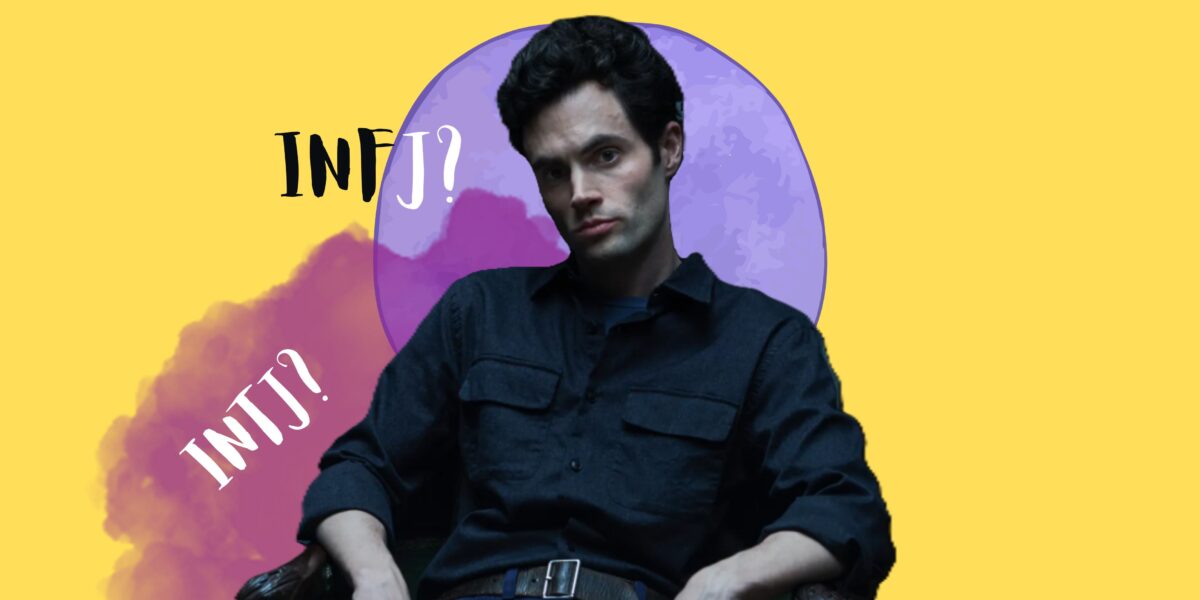Joe Goldberg is a controversial character from the Netflix series ‘You’. For the time that the show ran (September 9, 2018 to April 24, 2025) – and beyond that – Joe has remained a one-of-a-kind depiction of someone who violates boundaries (and kills people) in his pursuit of love. What makes his depiction (played by Penn Badgley) great is a multi-dimensional view of how someone who stalks or commits crimes of passion can rationalize their behaviors as justifiable.
I have attempted to explain Goldberg’s thinking and resulting behavior in another article.
In the current article, however, I will explain Goldberg’s personality specifically through two theories:
- The Big 5 Personality Trait Theory.
- Jungian personality theory – measured through Myers-Briggs Type Indicator (MBTI)
So, let’s first look at Joe Goldberg through the OCEAN (Big 5) model!
Joe Goldberg’s Big 5 Personality Traits
From a clinical lens, Joe is a tangle of competing beliefs, trauma, need, and moral ambiguity. Combined, these traits make him compelling, disturbing, and difficult for the average person to categorize.
That’s one of the reasons why people tend to not realize who he really is!
Below is how his Big Five traits interact in complex ways, with both strengths, weaknesses, and internal tension.
Openness to Experience: High
Joe’s openness is among his more “positive-seeming” qualities. He has a deep love of books, of ideas, and is open to newer value systems.
He also experiences wonder (for example, the way he idealizes characters like Brontë, seeing the world through romantic frames when he’s in love or fixation – check out the lake scene in Season 5). Plus, he’s tried different professions, moved across cities, been willing to change settings (sometimes to escape but sometimes to reinvent). One example of his openness to ‘change’ is how he even considers therapy with Love, which is an indicator of some willingness to explore inner life (btw, you should too!).
But this openness comes with cost.
It fuels his propensity to fantasize, to see people not as they are but as he wants them to be. When reality deviates, another one of his traits, neuroticism (explained in great detail further down this article) intervenes, leading to disillusionment – and sometimes rage (indeed people who are high in openness and neuroticism do tend to use immature defense mechanisms more).
There’s also a vulnerability: because he’s open to many experiences (love, beauty, connection), he suffers deeply when they fracture or betray his ideal.
Conscientiousness: Moderate
Contrary to some impressions, Joe’s conscientiousness is not uniformly high. He’s selective in where he invests discipline. Yes, he picks professions that allow him quiet, control, or flexibility. He maintains routines, covers up tracks when needed, plans, anticipates consequences. But much of this effort is in service of his own ends (control, security, love-hunting) rather than aligned with broader social or moral norms.
He lacks ambition in the conventional sense: big public goals, fame, upward status aren’t his drivers. This is what separates him from other psychopathic characters in TV such as Walter White or Hannibal Lector.
In fact, his lack of financial ambition or strife for power makes him an anomaly even with respect to psychological literature. Research notes that psychopaths are generally more preoccupied with attaining material success or gaining power. Goldberg does seem to enjoy power. However, he isn’t looking for social power as much as he prefers to directly control specific individuals he wants to. This is partly because he is introverted (explored further in the next trait below).
Morally, he is ambiguous – he rationalizes violence, murder, stalking as means to ends that, to him, are justified (“I know what’s best,” “I want what’s best for others,” “ethics can be bypassed”).
So, his conscientiousness is strong insofar as he cares about consistency with his own internal logic – but weaker in domains where that logic conflicts with external moral, legal, or relational demands.
Extraversion: Low to Moderate
Joe leans toward introversion: much of his life is solitary, operating behind scenes, avoiding large social circles. He picks jobs with less social exposure (except for his professorial detour); lives alone; isolates himself. Social blending isn’t his forte in bigger groups, especially when compared to characters who are more socially embedded.
This is most notable in how he does not seem to be as vocal or involved in with Kate’s bigger social circle in Season 4, as compared to Beck and Love’s more confined groups.
But this is not a simple low extraversion. He does pursue excitement: he seeks out specific people he finds interesting, he can charm, he can “turn on” charisma as needed. He is comfortable in one-on-one interactions, frequently talking his way into love interests’ lives or building more intimate relationships with people who he shares similarities with.
There’s a tension: between his need for solitude/control and his craving for connection and “being seen.”
Agreeableness: Moderate to Low
Joe’s agreeableness is compromised but not erased. His internal monologue is sharp, often critical of others. But he does agree with people even when it doesn’t outright serve his aims. For example, he can care for others’ autonomy as in the case of Dante and Paco. However, it does seem that he incorporates more from a utilitarian perspective (“if it helps my ends, or helps both of us”) than a purely empathetic one.
It is also important here to mention that Joe does seem to understand others’ perspectives on the level of thinking (aka cognitive empathy) rather than feeling (aka affective or emotional empathy). This shows up in how during his first interaction with Marienne Bellamy where he acknowledges the injustices faced by women of color but ends up (attempting to) deliberately killing her. Indeed, research also shows that people with the dark triad (psychopathy, narcissism and machiavellianism) do tend to lack in affective empathy but not necessarily in cognitive empathy.
He senses injustice, sees others’ suffering. He even sometimes attempts to help. There are also signs of loyalty, or concern (for example with Delilah, Paco, etc.), particularly toward those he forms a bond with.
At the same time, trust is scarce. He’s often wary of people’s motives or hidden flaws. He sets conditions (“you have to earn my trust”). He instrumentalizes kindness when it fits his goals but switches to manipulation or coercion when he feels betrayed or when someone doesn’t live up to his projected ideal. So, his agreeableness is conditional, contextual, constrained by his beliefs about control and his trauma.
Neuroticism: High
This is perhaps Joe’s most intense domain.
Joe shows persistent emotional instability: fear of abandonment or rejection; shame; deep internal conflict; self-doubt and identity confusion. His trauma (with his foster father, childhood in the “glass box,” etc.) underlies powerful core beliefs like “I cannot be accepted for who I am,” “I cannot change,” “people’s attitudes are fixed,” “I need to be loved,” “I have to be in control.” These beliefs set him up for frequent crises when relationships or reality fail to match his expectations.
His emotional reactivity is high – minor betrayals or perceived slights turn into outsized responses. He oscillates between idealization (of love, partners) and devaluation or violence when the fantasy is no longer possible. Guilt, rationalization, shame – these all swirl. He sometimes tries to do the “right thing” (therapy, caring for son, etc.), but is often overwhelmed or derailed by his deeper wounds.
Summary
All in all, Joe Goldberg’s personality traits indicate that he is very open to experiences, moderately conscientious (low when it comes to morality and ambition; high when it comes to conforming to routines), generally less social but still charming and excitement-seeking, disagreeable to a degree (can empathize on the level of thinking and likes to help sometimes but does not trust people and is often manipulative or extremely hostile), and very emotionally unstable.
Now, let’s shift our focus to a more psychodynamic view of Goldberg’s personality!
Joe Goldberg’s MBTI Type
While the Big Five captures the measurable dimensions of Joe’s personality, MBTI lets us explore how he processes the world and others.
So, let’s explore.
Introverted (I)
I’ve already explained how Joe’s life is largely lived in solitude. He thrives in quiet spaces: bookstores, his apartment, even during long stretches of surveillance. Social interactions are purposeful; he doesn’t seek connection for its own sake. Consider how he meticulously studies Beck’s routines before approaching her, or how he retreats after every conflict to reassess and plan. These behaviors are classic introversion: energy gained from reflection, not from being in the spotlight.
That being said, Joe gathers energy from his love interest too. As this is only one (or a few) person(s) at a time, he tends to fixate on them more. This is also in line with introversion.
Intuitive (N)
Joe doesn’t just observe; he interprets patterns, symbols, and hidden meanings. He reads people as if they were texts to decode. His intuition is evident in how he anticipates his love interests’ reactions, predicts rival behaviors, and even imagines future scenarios. For instance, his entire relationship with Love begins with going to the place where she is most likely to be. When things seem to not work out initially and Love apparently enjoys the company of another man, Milo, Joe tries to psychoanalyze him by stalking him and finding out deeper information on the guy.
Now, based on this behavior you might say that Joe is observant. This he most definitely is.
However, he starts with an intuition. This colors his perspective of the person which later changes after enough evidence has been gathered against that fact. Even then, rather than strictly focusing on the facts, he reads between the lines, forming opinions on patterns of evidence he finds.
On the symbolic side, he interprets ordinary moments as profound signs – like when he romanticizes Brontë floating in the boat, seeing her as unique in the entire world. This ability to see “what could be is a hallmark of intuitive cognition, though trauma distorts it into obsession and projection.
Thinking (T)
Joe is a planner first, lover second. His internal monologue frequently analyzes risk, consequences, and strategies rather than feelings. For instance, he calculates the precise timing for breaking into an apartment, erases digital footprints, or manipulates encounters to his advantage. Even when he claims he acts out of love, his actions are rooted in logic: minimizing threat, maximizing control. The thinking-dominant INTJ side drives both his brilliance and his dangerous behaviors.
Having said that, I do understand why many people on the internet characterize Joe as feeling. Much of his reasoning seems to be based on a warped understanding of love, anger and despair. He also, according to many people, wants to create a ‘perfect’ relationship.
However, does Joe actually claim that people are perfect? Or does he realize that relationships are flawed?
His apparent flexibility, which charms many of his love interests does seem to come from a genuine place of understanding. That is why he is apparently all for growing in the relationship. However, further below I have discussed what makes this dimension truly tricky for Joe’s personality type.
Read on!
Judging (J)
Structure, control, and predictability are non-negotiable for Joe. He imposes order on chaotic social and emotional worlds: keeping lists, controlling access, monitoring routines. When confronted with unexpected events – Beck’s jealousy, Love’s secrets – he quickly devises contingencies. Even his choice of jobs – bookstores, cafes, and later positions – reflects a need for environments that allow planning, observation, and autonomy. The Judging function ensures that his life is never left to chance, even if the moral cost is high.
The Trauma-Infused INFJ Shadow
Most evidence points to Joe as an INTJ – the master strategist – yet trauma has added layers that make him appear occasionally like an INFJ as I discussed earlier.
Where Joe seems INFJ-like is in the way he rationalizes his actions and idealizes love. He believes he is protecting those he obsesses over, framing stalking or violence as acts of care. When he writes love notes, leaves gifts, or stages “rescues,” he’s not merely controlling – he’s seeking narrative coherence in a world that has historically rejected or harmed him. Trauma has amplified this overlay: beneath the tough understanding that he is isolated, he longs for connection. Here thinking plays its role as a defense mechanism in order to make sense of the fact that he has not received true care and love ever since he gained consciousness.
However, he does not admit this – and his actions do suggest cold strategic thinking, which is more in line with an INTJ.
For example:
- He obsessively monitors Beck to prevent perceived danger, justifying it as protecting her.
- He plans elaborate scenarios to remove rivals, rationalizing that they “deserve” consequences.
- He imagines himself as the only one who truly understands or loves his chosen partner and follows up with actions which show his infatuation and obsession. But to him, these are requirements of love because of how people do not know what’s good for them – a deeply (flawed) rationalized view of the world.
Conclusion
What makes Joe chilling and strangely compelling is how his personality traits and coping mechanisms intertwine. On one hand, the Big Five shows us a man high in openness, moderately conscientious, selectively agreeable, and deeply anxious beneath the surface. On the other, the MBTI paints him as an INTJ strategist whose trauma pushes him toward INFJ-like rationalizations, allowing him to justify obsession as love and violence as protection.
This multidimensional profile explains why audiences remain drawn to him. He is not a flat villain but a mirror of contradictions: logical yet emotional, introverted yet charming, self-aware yet blind to his own distortions. In Joe, we see how intelligence, trauma, and longing can combine into a dangerous but deeply human psychological cocktail.
Joe forces us to ask unsettling questions about love, morality, and the fragile line between devotion and destruction.
I am a Clinical Psychologist and a Lecturer of Psychology at Government College, Renala Khurd. Currently, I teach undergraduate students in the morning and practice psychotherapy later in the day. On the side, I conjointly run Psychologus and write regularly on topics related to psychology, business and philosophy. I enjoy practicing and provide consultation for mental disorders, organizational problems, social issues and marketing strategies.





